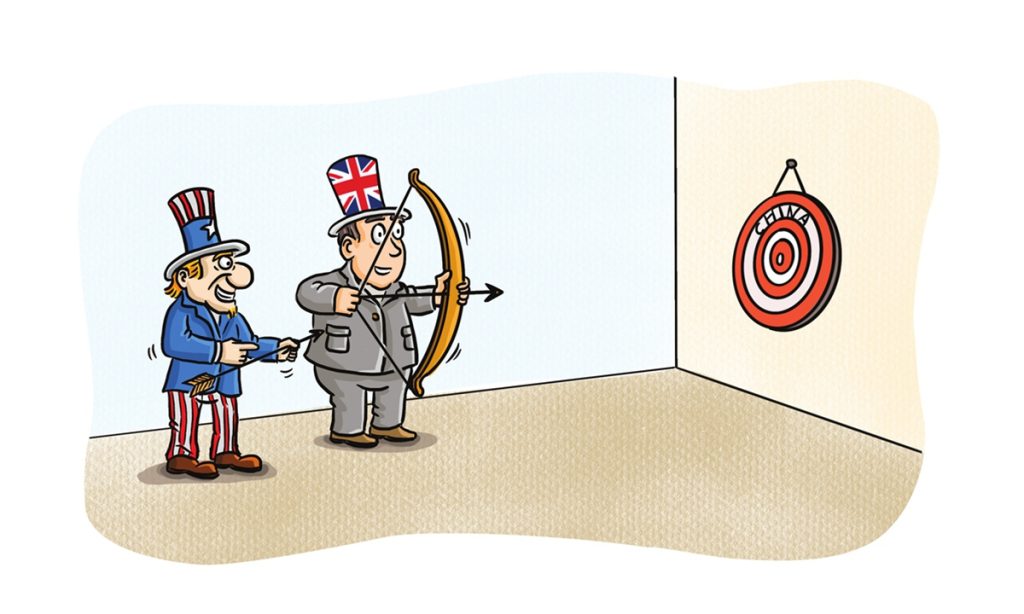UK hypes 'China's cyber-attacks,' as electoral politics drives blame shifting

The recent briefings run British politicians have started a new round of "China threat" hype with the focus on cybersecurity, a smear campaign not deviant from their long-term anti-China stance but intensified by the upcoming general election, Chinese observers said on Monday.
Deputy Prime Minister Oliver Dowden is set to inform parliament on Monday that Beijing is behind a wave of cyber attacks against members of parliament (MPs) and peers, as well as accessing the personal details of 40 million voters in a hack on the Electoral Commission last year, Sky News reported.
Parliament's director of security Alison Giles has convened a briefing with the attendance of a small group of China hawks, including former Conservative leader Sir Iain Duncan Smith, the former minister Tim Loughton, the crossbench peer Lord Alton and the SNP MP Stewart McDonald, the Times reported.
The four are members of the Inter-Parliamentary Alliance on China (IPAC), a cross-country anti-China coalition formed in 2020 that was derided as a contemporary era "Eight-Nation Alliance" invasion force.
Foreign Secretary Lord Cameron is also set to brief the 1922 Committee of backbench Conservative MPs on Monday evening, and the topic of China and security will likely be raised.
In response to those accusations against China, Chinese Foreign Ministry spokesperson Lin Jian said on Monday's routine press briefing that tracing cyberattacks is highly complex and sensitive. There should be sufficient, objective evidence when investigating and characterizing cyber incidents, rather than smear other countries without facts, let alone politicizing cyber security issues.
Cybersecurity is a global challenge and China is one of the major victims of cyber-attacks. China always resolutely resists all types of malicious online activities in accordance with the law, and advocates that all countries jointly respond through dialogue and cooperation, Lin said, "We hope that all parties will stop spreading false information, take a responsible attitude and jointly maintain the peace and security of cyberspace."
Hyping "cyber attacks from China" continues on the anti-China path of Conservatives and is not very different from the UK's past smear campaigns against Chinese firms or products. Basically their argument is "anything from China can constitute a threat," Li Guanjie, a research fellow with the Shanghai Academy of Global Governance and Area Studies under the Shanghai International Studies University, told the Global Times on Monday.
But intensifying such hypes at the moment is related to the general election to be held later this year, Li believes.
Prime Minister Rishi Sunak has declined to brand China a threat, despite pressure from some wings of the party, and as the election approaches, harden tone against China is an easy campaign method, analysts said.
Hao Min, dean of the Department of Law of the University of International Relations, told the Global Times on Monday that blame shifting is also an easy approach to divert domestic anxiety and discontent on sluggish economy and social issues.
Painting China as a security threat also paves to protectionist policies in economic realm, Hao said, citing the latest British media reports that Chinese-made electric cars in UK could be jammed remotely by Beijing.
Hao noticed the UK's hardline stance on China has become more prominent after the Brexit, as London aligned with Washington closer in foreign policy. The attacks on Chinese EVs came on heels of the US' similar smears.
As global geopolitics becomes "Cold War-alike," such camp-based rather than fact-based rows will continue, analysts said, but China will firmly reject such smear campaigns and defend its own interests in line with the law.
According to Guardian, the UK could impose sanctions on individuals believed to be involved in acts of state-backed interference. If the UK takes any concrete actions, they will be responded by countermeasures from China, analysts said.